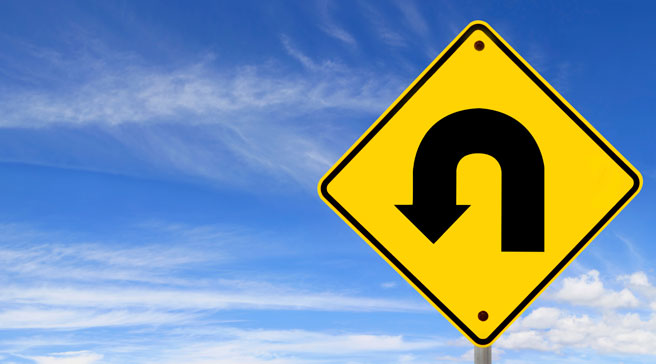How to manage a change of heart
It’s tough enough making big life decisions, but what happens when you realise that you’ve made the wrong choice? Finding the courage to do a U-turn could be the best way forward. By Emma Cook

This time last year, Angela was on the verge of a major life change – leaving her job in London to teach English in Columbia for a year.
‘I was about to turn 30 and it felt like my last chance to do something adventurous,’ she says. ‘I was bored, drifting in my relationship and my work. This felt like a way of breaking out of the rut.’
So far, so admirable. ‘They were very sweet at work, taking me out for leaving drinks and giving me a lovely leather rucksack. I got lots of “You’re so brave” and “Wow, what a great thing to do, I wish I was you”. ‘Then, a week before I was due to fly out, I had a massive re-think. My on-off boyfriend told me how upset he was that I was going away for a whole year, and that he couldn’t bear for me to go. And on the work front, I’d been studying photography as a hobby for years and, out of the blue, a gallery got in touch and wanted to see more of my work. Suddenly, it felt like the wrong time to leave, but I’d told everyone I was going and I felt like a bit of a fool to change my mind.’
Angela agonised over her decision, but eventually realised that suffering a few embarrassing conversations was a small price to pay for making the right choice. Many of us will identify with this – we’d rather do anything than admit to a U-turn, an act that might make us appear flaky and a time-waster. The very word U-turn sounds dramatic and extreme; a complete reversal in direction, no half measures. By its nature, a U-turn is also very public. There’s no chance of avoiding our peer group gossiping and judging our actions. But if we want to be able to embrace more choice in our lives, we have to learn to conquer our fear of the U-turn and even turn it to our advantage.
These days we’re bombarded with such a bewildering array of choices that the pressure on us to make the ‘right’ decision is greater than ever. Perhaps this is why it is so difficult to announce that we made the wrong choice.
It’s a theory that Barbara Kelley explores in her book Undecided, after having noticed a marked malaise among the students she taught. ‘These girls were blessed to have all kinds of opportunities, yet they were dissatisfied and overwhelmed,’ she says. ‘A friend’s bright, talented daughter once said she wished she’d been born into a culture where everything – from spouse to career – was chosen for her.’ It’s a sad state of affairs, says Kelley. A bad choice is always better than making no choice at all. ‘Failure is recoverable, regret is much tougher,’ she says. She describes our reluctance to take a risk as ‘analysis paralysis’.
We’re frozen by the possibility of so much to win but much more to lose. The downside of unlimited choice is unlimited responsibility, which means, as Angela discovered, admitting that we made the wrong decision and we’d like to do something else.
So how do we exit successfully from a U-turn? Nina Grunfeld, founder of Life Clubs, says there’s no need to apologise for a volte-face, unless it affects others. ‘Explain the reasoning behind your decision and how you’ve made your new decision in time and acted swiftly,’ she says. The boldness of your new direction may even provoke some envy. ‘Lots of people will wish they had the courage to change course like that,’ says Grunfeld. ‘They may feel boxed in themselves and admire your courage to say, “No, this isn’t right”.’
Confidence is a crucial factor if you want to present your U-turn as inspirational and brave. ‘When you’re explaining your actions to people, hold on to your decision with conviction,’ says Dena Michelli, co-author of A Matter Of Choice: A Companion For Making Everyday Or Life-Changing Decisions. ‘Lay it out for them and pre-empt their reactions. If you’re tentative and they sense any doubt, it will give people a chink to enter and gain leverage.’
If there is an element of doubt, however, Michelli suggests asking close friends for advice before you go public. And don’t beat yourself up when you do decide to change tack. A U-turn doesn’t have to be a sign of weakness or not knowing your own mind. If our goals and desires are continually evolving, why shouldn’t our decisions reflect this? Alex Lickerman, a practising buddhist and vice-president of student counselling services at the University of Chicago, agrees. ‘Circumstances never remain static, so why should our responses to them be forever locked in their initial form?’ he says. ‘The best answer often changes over time.’








